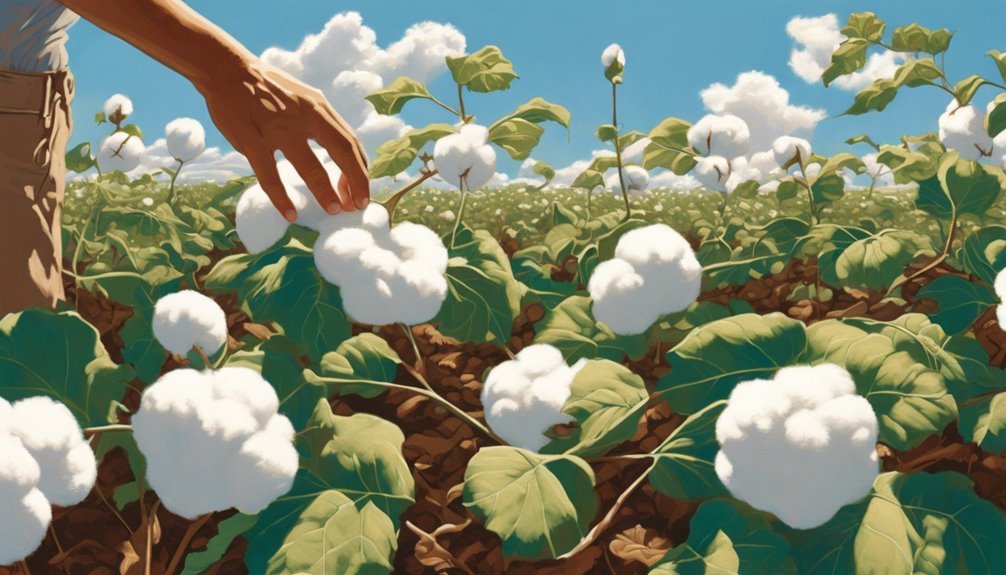How Organic Cotton Socks Are Made Sustainably
Organic cotton socks are made sustainably by prioritizing eco-friendly farming and ethical labor practices. Farmers grow cotton without harmful chemicals, using natural alternatives that enhance soil health. During production, low-impact dyes are employed, and water is recycled to minimize waste. Fair wages and safe working conditions for workers are central to the process, ensuring they thrive. Each step emphasizes a commitment to sustainability. Explore how the lifecycle of organic cotton contributes to a greener future ahead.
The Cultivation of Organic Cotton

When you think about the journey of organic cotton, it all starts in the fields where sustainable farming practices make a significant difference. By focusing on soil health, organic cotton farmers nurture the land, ensuring it remains fertile and vibrant. They avoid synthetic fertilizers and pesticides, opting for natural alternatives that promote a thriving ecosystem. Crop rotation plays an essential role here, as it prevents soil depletion and minimizes pests, allowing for a diverse range of crops to flourish. This method not only enhances the quality of the cotton but also contributes to the overall well-being of the environment. Embracing these practices, you're supporting a sustainable future, where freedom from harmful chemicals means healthier soil, better crops, and a cleaner planet for everyone.
Eco-Friendly Farming Practices
Eco-friendly farming practices are essential for sustainable agriculture, and they can greatly impact the quality of organic cotton production. By utilizing techniques like crop rotation, you're not only improving soil health but also promoting biodiversity. This method helps prevent pest infestations and diseases, leading to healthier crops.
Here's a quick overview of key practices:
| Practice | Benefits | Impact on Soil Health |
|---|---|---|
| Crop Rotation | Reduces pests | Enhances nutrient balance |
| Cover Cropping | Prevents erosion | Increases organic matter |
| Organic Fertilizers | Promotes soil life | Improves nutrient retention |
Sustainable Production Processes
While many factors contribute to the sustainability of organic cotton socks production, the processes used during manufacturing play an essential role in minimizing environmental impact. Brands committed to eco-conscious design embrace sustainable materials, ensuring that every step, from spinning to dyeing, is as green as possible. They often utilize low-impact dyes and energy-efficient machinery, reducing waste and pollution. Additionally, water usage is carefully managed, employing techniques that recycle and purify water during production. Choosing responsible suppliers further enhances sustainability, creating a supply chain that respects the planet. By prioritizing these sustainable production processes, you're not just buying socks; you're supporting a movement towards a healthier future, celebrating freedom and responsibility in every step you take.
Ethical Labor Practices

Although the production of organic cotton socks focuses heavily on sustainable materials, ethical labor practices are equally essential in creating a responsible product. When you choose these socks, you support a movement that champions fair treatment for workers. Here are three key aspects to take into account:
- Fair Wages: Workers deserve compensation that reflects their skills and labor, ensuring they can support their families.
- Worker Rights: Upholding fundamental rights, such as safe working conditions and freedom from discrimination, fosters a healthier work environment.
- Community Support: Ethical production often invests in local communities, contributing to education and healthcare initiatives.
The Lifecycle of Organic Cotton Socks
Understanding the lifecycle of organic cotton socks reveals how every stage contributes to sustainability and ethical practices. From seed to sock, each step prioritizes eco-conscious choices.
| Stage | Description | Impact on Sustainability |
|---|---|---|
| Cultivation | Grown without harmful chemicals | Promotes soil health |
| Harvesting | Handpicked to guarantee quality | Reduces waste |
| Organic Dyeing | Utilizes natural dyes | Minimizes water pollution |
| Production | Focus on sock durability | Guarantees long-lasting products |
Frequently Asked Questions
Are Organic Cotton Socks Biodegradable?
Yes, organic cotton socks are biodegradable materials, making them a great choice for sustainable fashion. When you choose them, you're not just being stylish; you're also supporting eco-friendly practices that promote a healthier planet.
How Do Organic Cotton Socks Compare to Conventional Socks?
When you compare organic cotton socks to conventional ones, you'll notice sustainability benefits like reduced chemical usage and eco-friendly materials. Plus, the comfort factors of organic cotton make them softer and gentler on your skin.
What Certifications Should I Look for in Organic Cotton Products?
When you're choosing organic products, think of certification labels as a treasure map. Look for GOTS or OEKO-TEX, ensuring sustainable practices. They guide you to eco-friendly choices, giving you peace of mind in your purchase.
Can I Machine Wash Organic Cotton Socks?
Yes, you can machine wash organic cotton socks! For best results, follow these washing tips: use cold water, gentle cycles, and avoid harsh detergents. These laundry considerations help maintain their softness while being eco-friendly. Enjoy your freedom!
Where Can I Buy Sustainable Organic Cotton Socks?
Finding sustainable organic cotton socks is like discovering hidden treasure. Look for ethical shopping options at sustainable brands like Pact or Bombas, where you can embrace eco-friendly fashion while supporting environmentally conscious practices.







